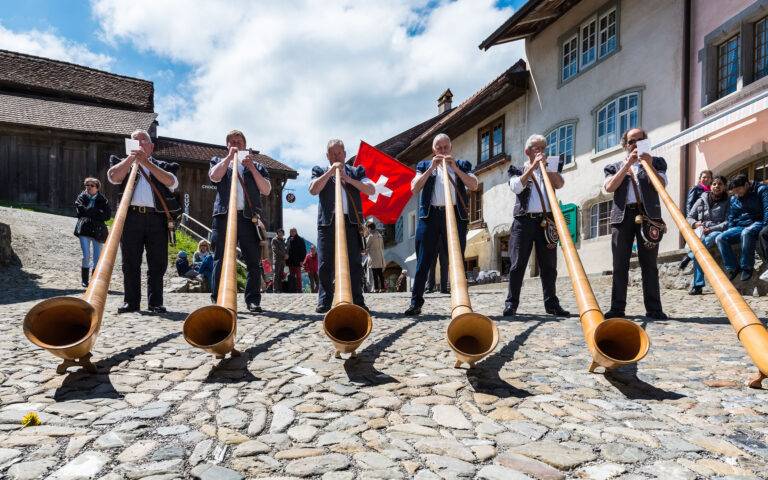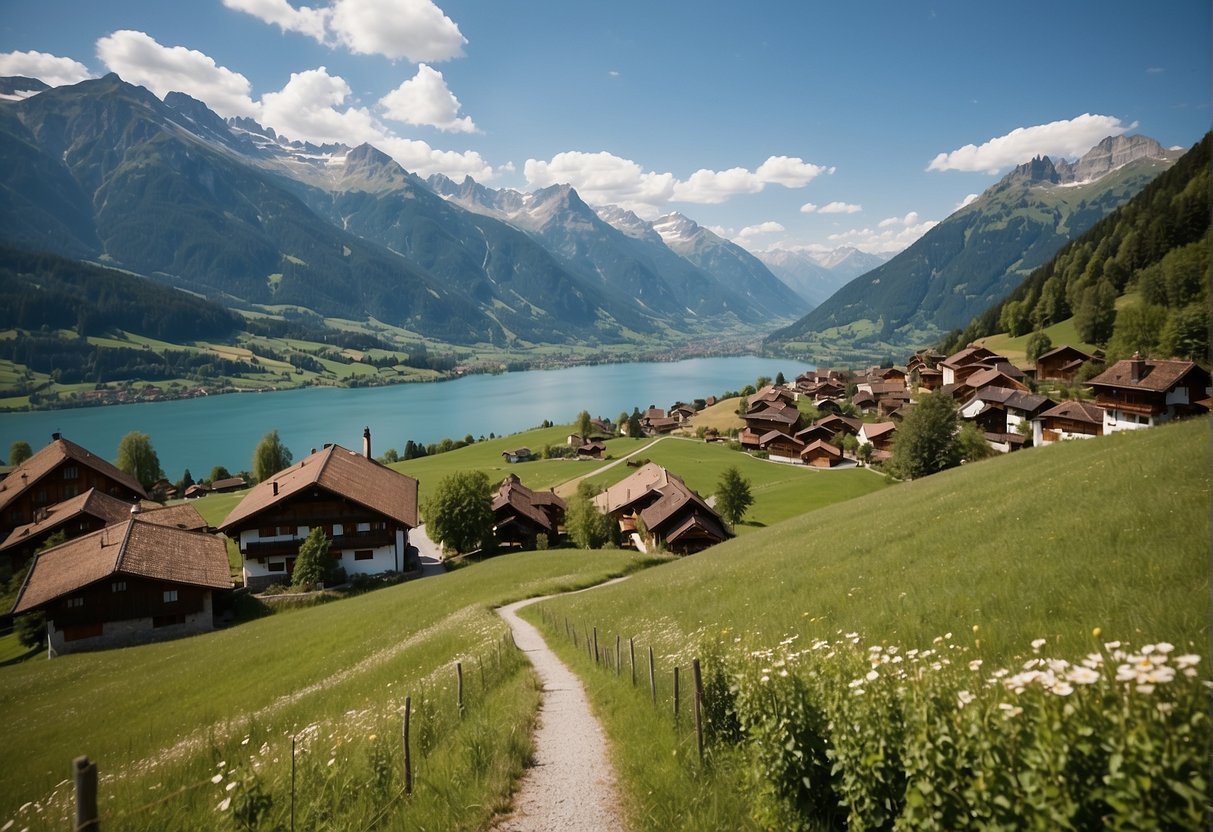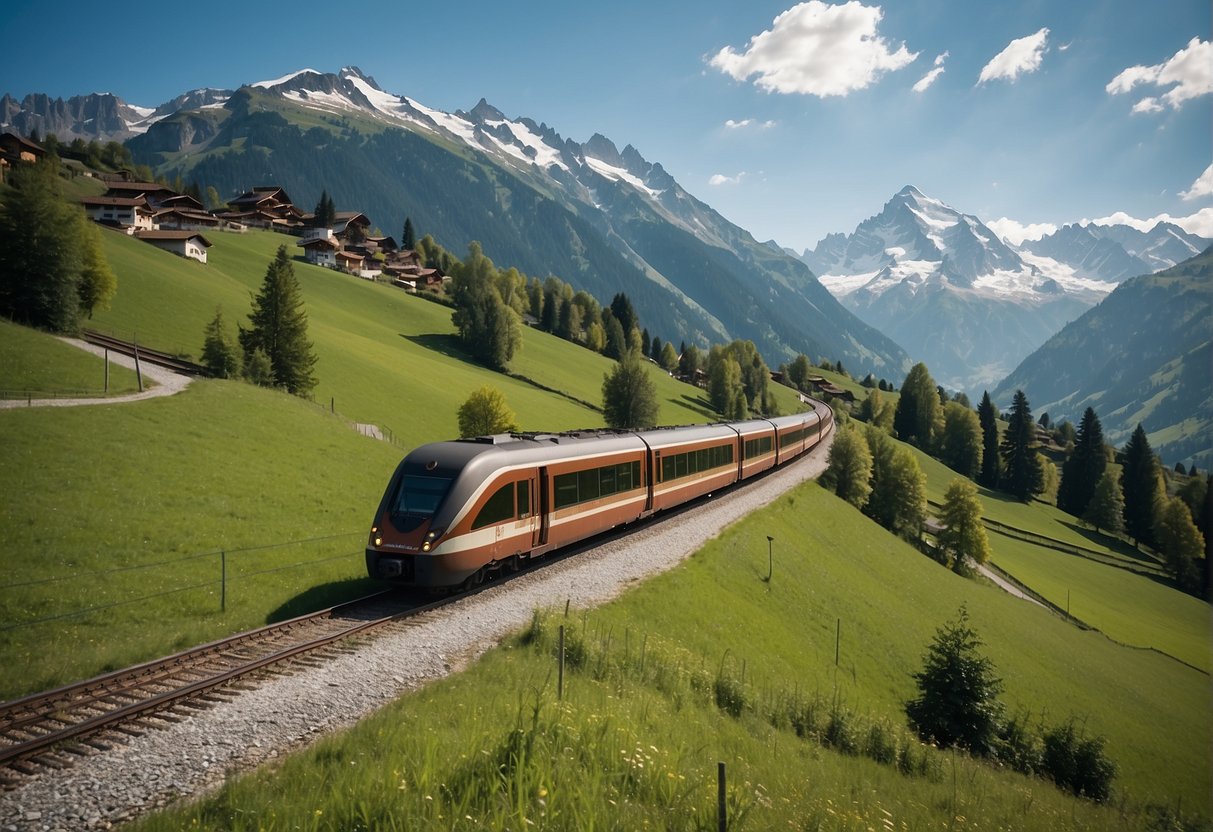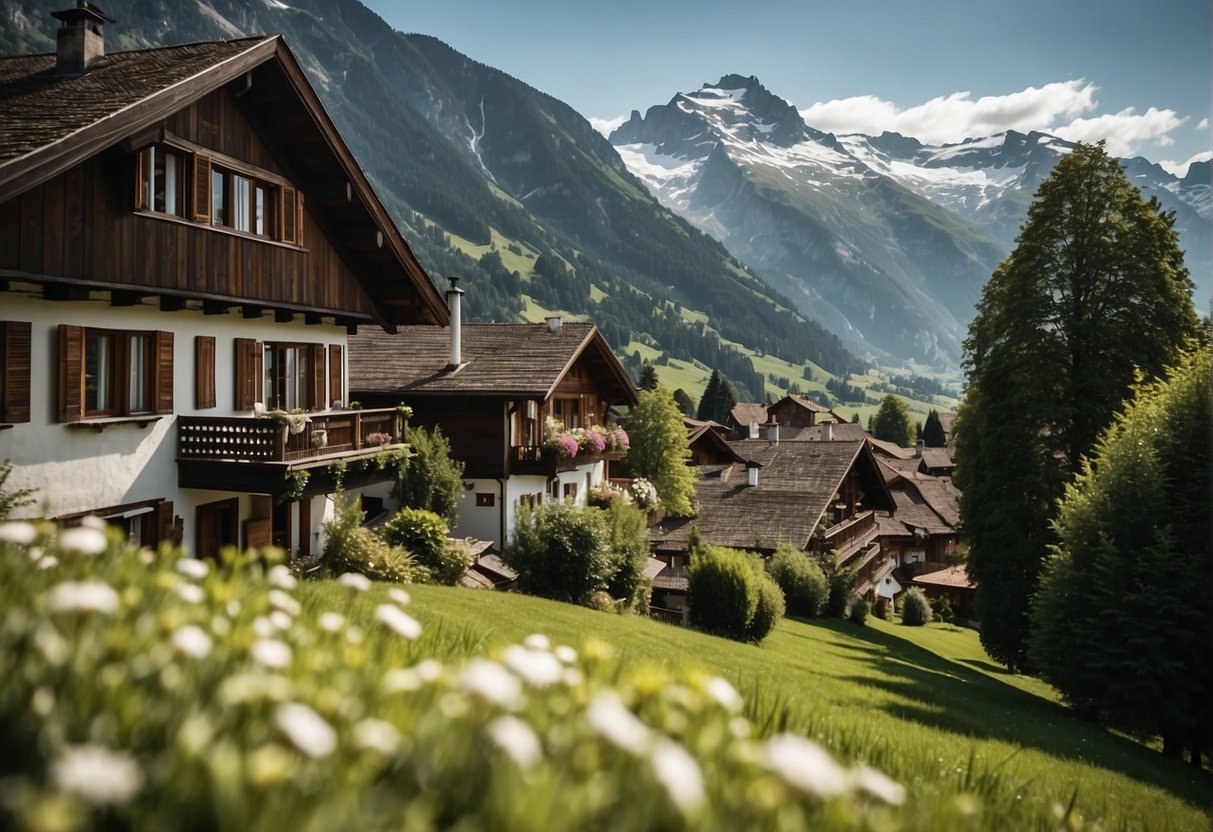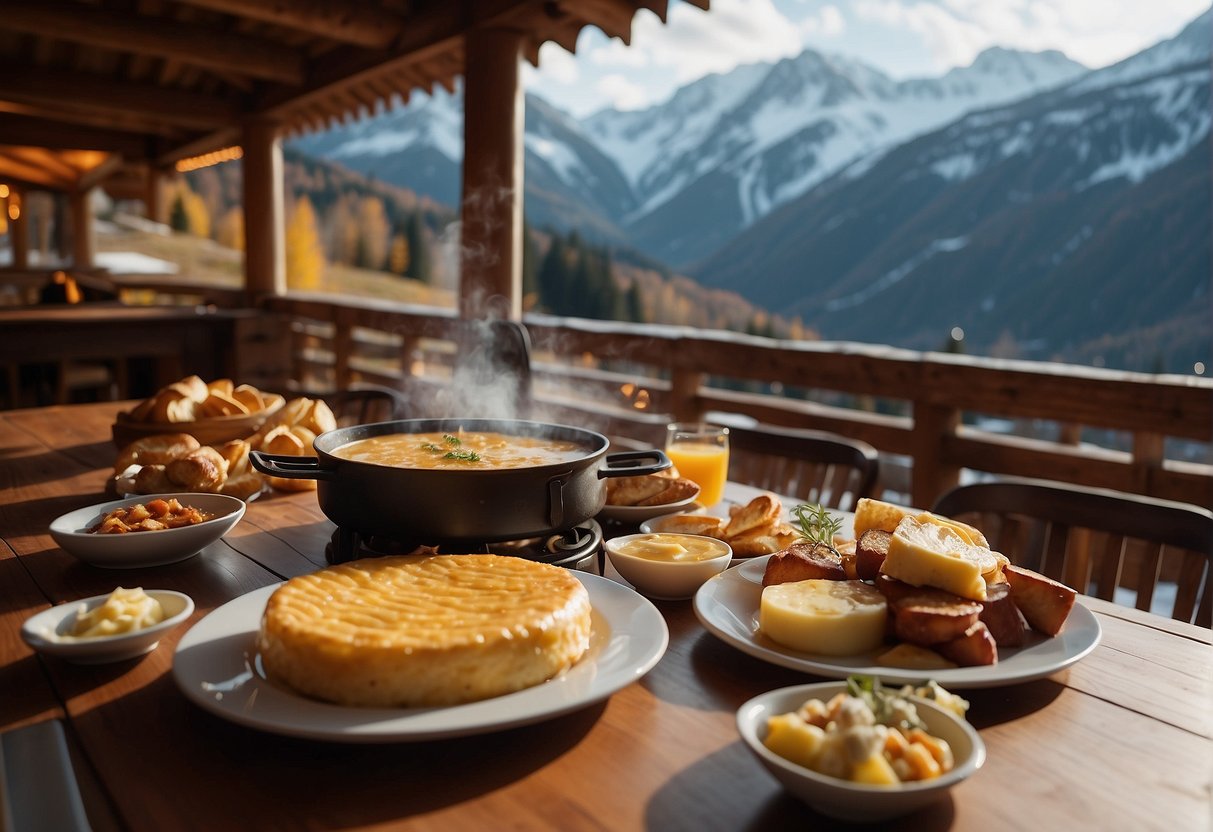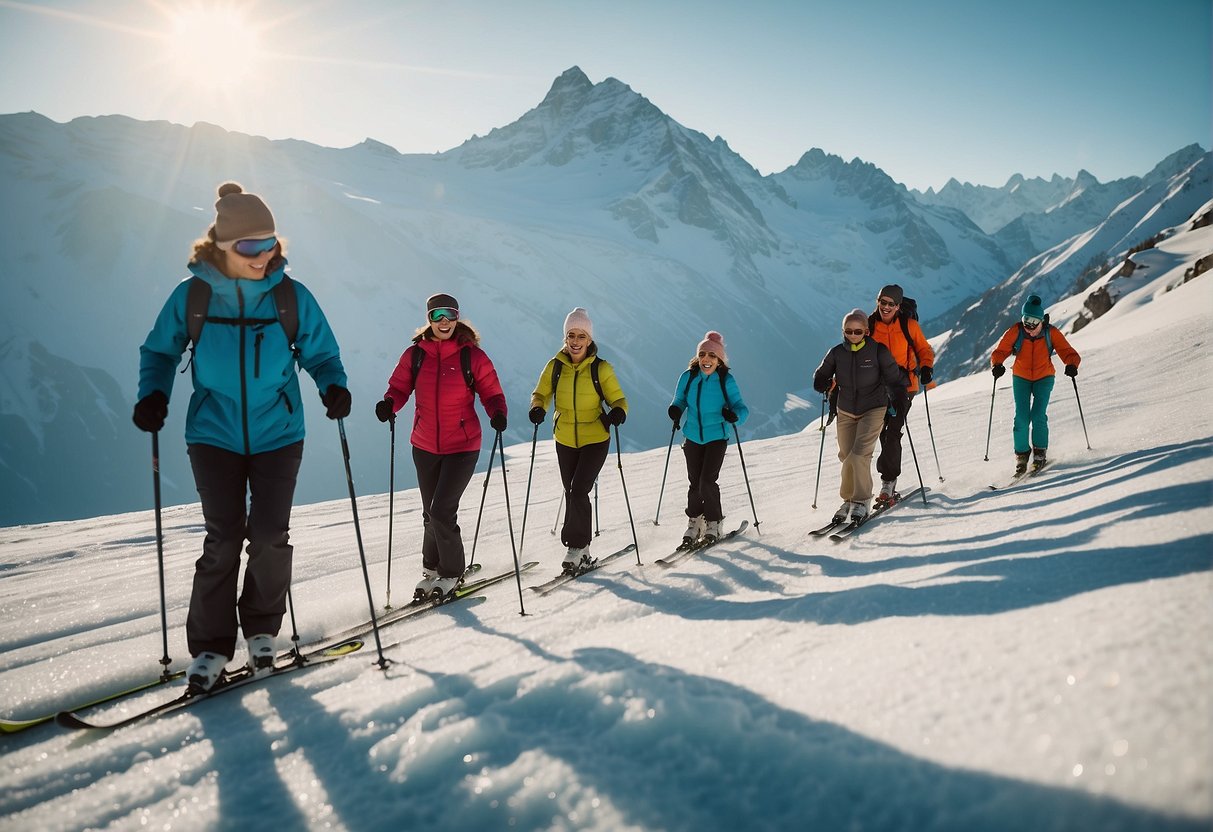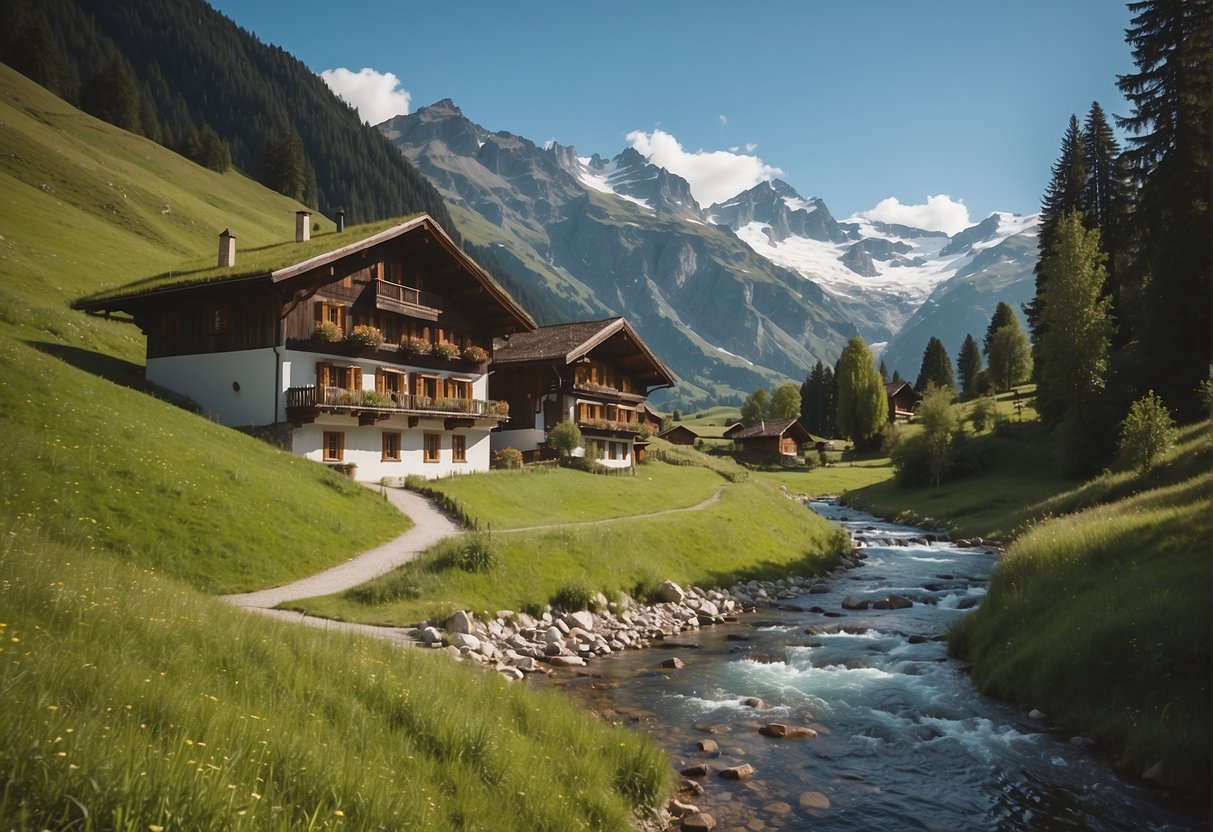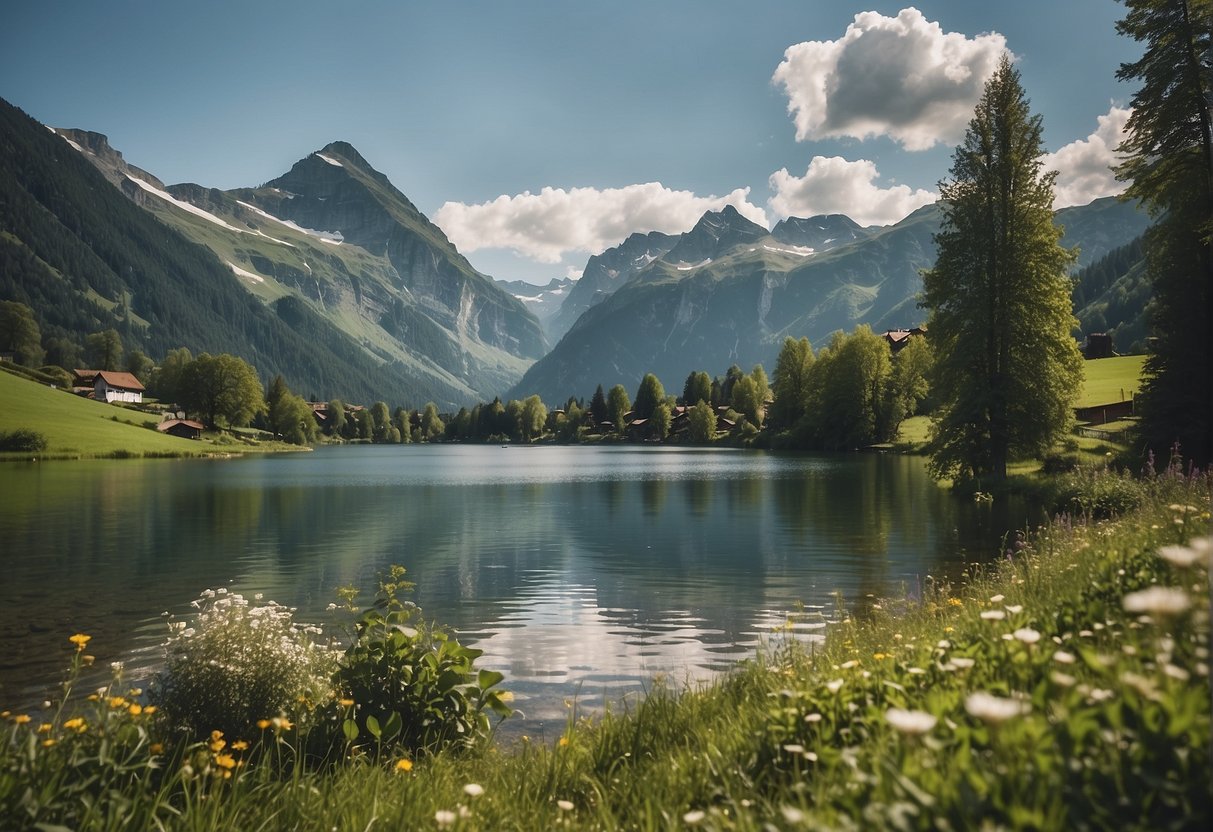“Switzerland: Where Every Moment is a Breath of Fresh Alpine Air!”
A journey to Switzerland offers the quintessential alpine experience with a blend of breathtaking landscapes and urban elegance. Tourists encounter a country that harmoniously intertwines cultural vibrancy with natural splendor, forging a destination that appeals to a wide range of travelers. With an exceptional public transportation system, navigating the picturesque cities and the majestic Swiss Alps becomes as seamless as it is pleasurable.
Switzerland asserts its uniqueness through diverse regional identities, giving visitors a taste of its multinational heritage. From the Italian flavor of Ticino, the French flair in Geneva, to the Germanic essence of Zurich, the cultural tapestry is rich and inviting. Travelers not only witness the cultural mosaic but also indulge in the culinary delights that accompany it, from sumptuous Swiss chocolates to the iconic cheese fondue.
Outdoor enthusiasts find their haven in Switzerland’s natural terrain, celebrated for offering some of Europe’s most iconic skiing, hiking, and boating. The serene beauty of Lake Geneva or the grandeur of the Matterhorn exemplifies the country’s capability to present postcard-perfect sceneries at every turn. One can chart a course through vibrant cities, quiet mountain villages, and serene lakes, crafting an itinerary that captures Switzerland’s essence—whether for a brief sojourn or an extended exploration.
Planning Your Swiss Journey
When embarking on a Swiss journey, travelers must consider the optimal time for their visit, chart out the must-visit destinations, secure suitable accommodations, prepare a thorough budget, and pack appropriately for the regional climate and activities.
Choosing the Best Time to Visit
The ideal time for a Swiss adventure depends on the traveler’s interests. Winter sports enthusiasts thrive from November to March, while those looking for hiking and swimming may prefer the summer months. To avoid crowds, one might target spring or fall.
Route Mapping and Destinations
Mapping a route ensures a well-structured itinerary. For travelers using the Swiss Travel Pass, it’s essential to maximize its benefits by planning travel between destinations like Zurich, the Bernina Express, and Lugano efficiently.
Accommodation Options
Switzerland offers a broad range of lodging, from luxury hotels to cozy chalets. Travelers should book early, especially for popular options like panoramic train rides, to secure the best spots.
Budgeting for the Trip
Creating a budget requires an understanding of travel costs, including transportation, accommodation, food, and activities. Switzerland is known for its higher living expenses, so travelers should plan accordingly and monitor exchange rates.
Packing Essentials
Packing for Switzerland varies by season. Essentials include:
- Winter: Warm layers, waterproof clothing, and snow gear
- Summer: Lightweight attire, a sturdy pair of hiking boots, and swimsuits
- Year-round: Sunscreen, a first-aid kit, and a power adapter
Travelers should always prepare for sudden weather changes due to Switzerland’s alpine environment.
Swiss Transportation Guide
Switzerland offers a reliable and efficient transportation system, which includes trains, buses, and cars. Visitors can expect punctual services and a variety of scenic routes that make traveling through the country a pleasant experience.
Navigating Swiss Public Transport
Swiss public transport is known for its punctuality and network density. Train travel is one of the most popular methods, with frequent connections across the country and into neighbouring nations. According to myswissalps.com, travelers can reach Switzerland conveniently by rail without the hassle of check-in procedures common with air travel. The SBB Mobile App is a handy tool for managing transit schedules; tourists should consider mastering it to enhance their journey. Furthermore, to save on costs, traveling with the appropriate pass is advantageous, as observed in Aplins in the Alps.
Car Rentals and Driving
For those preferring flexibility, renting a car is a feasible option. Driving allows travelers to explore Switzerland at their own pace, visiting destinations that might be less accessible by public transport. MSN highlights that car rental can be particularly useful for reaching remote areas. However, drivers should be prepared for mountainous roads and winter conditions.
Scenic Train Routes
Switzerland boasts some of the most breathtaking train journeys in the world. A notable example is the GoldenPass Express, featured in Newly Swissed, which offers panoramic views and technology that eliminates the need for transfers during the trip. For any rail enthusiast or sightseer, these scenic routes offer a unique way to witness Switzerland’s natural beauty.
Top Destinations in Switzerland
Switzerland offers a diverse array of breathtaking destinations, from the towering Swiss Alps to the serene lakes and the rich cultural heritage evident in its historic cities.
The Swiss Alps
The Swiss Alps are synonymous with majestic peaks and world-class skiing. Destinations like Zermatt provide access to iconic mountains such as the Matterhorn. In the summer, areas like the Jungfrau Region beckon hikers and outdoor enthusiasts with its trails and panoramic vistas.
Historic Cities and Cultural Sites
Switzerland’s cities are treasure troves of culture and history. Bern, the capital, is known for its well-preserved medieval city center, while Lucerne captivates visitors with its historic bridges and beautiful old town. The cultural offerings are rich, from Zurich’s museums to Geneva’s international vibrancy.
Natural Landscapes and Parks
Away from urban centers, Switzerland’s natural landscapes beckon. The Rhine Falls, Europe’s largest waterfall, is a natural wonder not to be missed. National parks such as the Swiss National Park in the Engadin Valley offer an unspoiled refuge for native flora and fauna.
Lakes and Recreational Areas
Switzerland’s numerous lakes serve as focal points for relaxation and recreation. Lake Geneva is celebrated for its deep blue waters and the surrounding towns of Montreux and Lausanne, while Lake Lucerne is surrounded by mountains, offering stunning views and boating opportunities.
Swiss Cuisine and Dining
Swiss cuisine offers an intriguing blend of flavours and traditions, reflecting the nation’s diverse heritage and landscape. It’s a realm where hearty mountain fare meets delicate confections, and communal dining is a celebrated practice.
Traditional Swiss Dishes
Swiss dishes are often centered around locally-sourced cheese and potatoes due to the country’s strong dairy farming tradition. Fondue and raclette are iconic dishes symbolizing Swiss camaraderie, with fondue being a communal pot of melted cheese into which diners dip bread. Raclette involves scraping off melted cheese onto potatoes and is tailored to personal tastes with various accompaniments. Another traditional dish to try is the Berner platte, a bountiful mix of sauerkraut, beef, offal, potatoes, and green beans, representing a feast from the capital, Bern.
Dining Etiquette
Dining etiquette in Switzerland is formal and polite with a strong emphasis on punctuality. Guests are expected to wait until the host has invited them to start eating. Passing dishes and using utensils correctly are crucial, and hands should be visible, not resting in laps. The Swiss typically use their cutlery to cut most foods, even those that might be eaten by hand elsewhere, such as pizza.
Chocolate and Cheese Tasting
Switzerland is renowned for its high-quality chocolate and cheese, which are seen as national treasures. Tastings often involve a range of textures and flavours, from smooth milk chocolate to rich dark varieties. Cheese tastings may feature everything from the nutty Gruyère to the creamy Emmental. Engaging in a chocolate and cheese tasting is a quintessential Swiss experience, reflecting the country’s dedication to artisanal craftsmanship and culinary excellence.
Outdoor Activities and Sports
Switzerland is a playground for lovers of the outdoors, offering a diverse range of activities that capitalize on its stunning alpine landscapes and pristine lakes. From exhilarating winter sports to scenic summer adventures, visitors are spoilt for choice no matter the season.
Skiing and Snowboarding
The Swiss Alps provide some of the world’s most iconic skiing and snowboarding destinations. Resorts like Zermatt offer access to breath-taking slopes with the majestic Matterhorn as a backdrop. Meanwhile, the region of Interlaken is famed for its wide variety of winter sports and ski & snow tours. With state-of-the-art facilities and terrains for all skill levels, these areas are a winter enthusiast’s paradise.
- Best Period for Skiing: December to April
- Popular Regions: Verbier, St. Moritz, Davos
- Skill Level Ranges: Beginner to Expert
Hiking and Trekking
During warmer months, Switzerland’s trails beckon hikers and trekkers. Lucerne’s surrounding trails give way to panoramic views and the chance to explore at one’s own pace. Those seeking a challenge can embark on multi-day treks such as the Haute Route, which links the two alpine hubs of Chamonix and Zermatt. Hiking trails range from leisurely walks by the lakeside to rigorous mountain ascents.
- Noteworthy Trails: The Eiger Trail, The Five Lakes Walk
- Trail Difficulty: Varies from Easy to Challenging
- Scenic Spots: Lauterbrunnen Valley, Swiss National Park
Water Sports and Summer Activities
Switzerland’s lakes and rivers offer a variety of water sports, including sailing, windsurfing, and canoeing. Lake Geneva and Lac de Joux in the Jura region, are popular for their water-based activities accompanied by scenic views. Moreover, the warmer months enable adventurers to indulge in paragliding and mountain biking, making the most of Switzerland’s versatile terrain.
- Water Sports Hotspots: Lake Lucerne, Lake Zurich
- Activities: Kayaking, Stand Up Paddleboarding, River Rafting
- Summer Festivals: Montreux Jazz Festival, Locarno Film Festival
Whether carving down a powdery slope, trekking a lush trail, or gliding across a serene lake, Switzerland provides an unrivaled outdoor experience for sports enthusiasts and adventurers alike.
Cultural Experiences
Switzerland’s cultural panorama is replete with vibrant festivals, prestigious museums, and distinct local customs that showcase the country’s rich heritage and artistic prowess.
Festivals and Events
Switzerland offers a plethora of festivals that reflect its cultural diversity and celebrate its traditions. The country is renowned for events such as Basel’s Fasnacht, a three-day euphoric carnival known for its elaborate masks and parades. Visitors can also experience the traditional Cow Parades in the Alps, where beautifully adorned cows are led down to the valleys in autumn. Geneva’s L’Escalade is another notable event commemorating the city’s historic victory with parades and chocolate cauldrons.
Museums and Art Galleries
Art enthusiasts can indulge in a sweeping array of artworks housed in Switzerland’s multitude of museums and galleries. The Kunsthaus Zürich is celebrated for its impressive collection of modern and contemporary art, while the Swiss National Museum offers insights into the historical journey of the Swiss nation. The country’s commitment to art extends to its architecture, such as the iconic Fondation Beyeler in Basel.
Language and Local Customs
Switzerland boasts four official languages: German, French, Italian, and Romansh, reflecting its multicultural essence. Visitors often remark on the precision and punctuality pervasive in Swiss society, an attribute that extends to their highly efficient public transportation system. Traditional customs include yodeling, alpine horn playing, and fondue sharing, which continue to play a pivotal role in Swiss social gatherings.
Safety and Health Considerations
Travelers heading to Switzerland should prioritize their health and safety to ensure an enjoyable trip. Switzerland maintains a reputation for being a safe destination with relatively low crime rates, but it’s still essential for visitors to take precautions.
Personal Safety:
- Petty Crime: Incidents can occur in tourist areas and public transport. It is advisable to watch belongings and be vigilant of distraction thefts.
- Outdoor Activities: Switzerland’s alpine environment calls for safety measures, especially while participating in outdoor sports. Adequate preparation and equipment are crucial for activities such as hiking and skiing.
Health:
- Medical Facilities: Switzerland boasts high-quality medical facilities. However, travelers should have travel insurance as healthcare costs are significant.
- Vaccinations: Routine vaccines should be up to date. The CDC recommends certain vaccines depending on the area and activities planned.
Environmental Hazards:
- Altitude: As altitudes can reach over 2,000 meters, altitude sickness is a risk. Acclimatization and hydration are important.
- Weather Conditions: The weather can change quickly. Dress in layers and be prepared for varying conditions.
Food and Water Safety:
- Consumption: One should consume only safe food and bottled water to avoid potential stomach ailments, despite high standards of food hygiene.
By remaining aware and prepared for these considerations, travelers can ensure their Swiss journey remains a pleasant memory.
Sustainable Travel in Switzerland
Switzerland has long been at the forefront of sustainable travel initiatives. With a mindset deeply rooted in the care for the environment, the Swiss have developed a comprehensive strategy known as Swisstainable, which emphasizes a deep connection with nature coupled with responsible tourism practices.
Transportation in Switzerland is a paragon of eco-friendly travel. The country boasts an extensive and efficient public transportation network that helps reduce carbon emissions. As an incentive, travelers can opt for offers like the summer GA travelcard, promoting longer stays with unlimited travel.
The Swiss commitment to sustainability is also noticeable in the accommodation sector. Hotels and lodges are increasingly adopting green practices, from energy conservation to waste reduction, catering to those who wish to travel with a smaller ecological footprint.
| Sustainable Practices | Description |
|---|---|
| Energy Conservation | Use of renewable energy sources and energy-efficient systems in hotels. |
| Waste Reduction | Implementation of recycling programs and reduction of single-use plastics. |
| Local Sourcing | Restaurants focus on using locally sourced ingredients to support communities and reduce transport emissions. |
Visitors are encouraged to engage with nature in a manner that respects the locale’s delicate ecosystems. Whether hiking in the Alps or enjoying the scenic beauty of Swiss lakes, the approach to tourism is about appreciating the natural environment without causing harm.
The integration of sustainable practices is seen as a path to richer experiences for visitors. By traveling sustainably, visitors not only enjoy Switzerland’s picturesque landscapes but also contribute to the nation’s conservation efforts, ensuring these treasures are preserved for future generations.
Frequently Asked Questions
When planning a journey to Switzerland, travelers often have several inquiries regarding entry requirements, itinerary optimization, must-see destinations, transportation, budgeting, and trip planning from the United States. These frequently asked questions aim to provide clear and concise answers to assist in preparing for a memorable Swiss adventure.
What are the essential travel requirements for visiting Switzerland?
Visitors to Switzerland should have a valid passport, and depending on their nationality, a visa may be required. For stays up to 90 days, tourists from the U.S., Canada, and EU countries do not need a visa. Travel insurance is also recommended.
How can one optimize a 7-day itinerary when traveling in Switzerland?
To make the most of a 7-day itinerary in Switzerland, travelers should consider focusing on a particular region or choose a central location like Lucerne or Interlaken as a base for day trips. Including a mix of cities, mountains, and scenic train rides can provide a well-rounded experience.
What are some must-see destinations for a first-time visit to Switzerland?
For a first-time visit, one should not miss the iconic Matterhorn in Zermatt, the serene beauty of Lake Geneva, the picturesque city of Lucerne, and the capital, Bern. Each destination offers unique sights and experiences rich in Swiss culture.
What are the most cost-effective transportation options for touring Switzerland?
The Swiss Travel Pass provides unlimited travel on the country’s public transportation network and can be a cost-effective option. Additionally, considering regional passes and discount offers for families can further reduce costs.
Can you provide guidance on budgeting for a Switzerland trip, including typical costs?
Switzerland is known for being a higher-cost destination. Budgeting should include accommodations averaging $100-$200 per night, meals around $40 per person per day, and transport passes. Advance booking and exploring local supermarkets for meals can help manage expenses.
What tips can you offer for planning a Swiss trip from the United States?
Travelers from the United States should check for any travel advisories, ensure their passports are valid for at least six months beyond their planned stay, and consider arriving in a major city like Zurich or Geneva for convenient transport links to other parts of the country.


